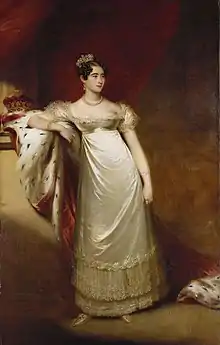Princess Augusta of Hesse-Kassel
Princess Augusta of Hesse-Kassel (Augusta Wilhelmina Louisa; 25 July 1797 – 6 April 1889) was the wife of Prince Adolphus, Duke of Cambridge, the tenth-born child, and seventh son, of George III of the United Kingdom and Charlotte of Mecklenburg-Strelitz. The longest-lived daughter-in-law of George III, she was the maternal grandmother of Mary of Teck, wife of George V.
| Augusta of Hesse-Kassel | |||||
|---|---|---|---|---|---|
| Duchess of Cambridge | |||||
 Portrait by William Beechey, 1818 | |||||
| Viceregal consort of the Kingdom of Hanover | |||||
| Tenure | 7 May 1818 – 20 June 1837 | ||||
| Viceroy | Prince Adolphus | ||||
| Born | 25 July 1797 Rumpenheim Castle, Offenbach am Main | ||||
| Died | 6 April 1889 (aged 91) St James's Palace, Pall Mall, London | ||||
| Burial | 13 April 1889 | ||||
| Spouse | |||||
| Issue | Prince George, Duke of Cambridge Augusta, Grand Duchess of Mecklenburg-Strelitz Princess Mary Adelaide, Duchess of Teck | ||||
| |||||
| House | Hesse-Kassel | ||||
| Father | Prince Frederick of Hesse-Kassel | ||||
| Mother | Princess Caroline of Nassau-Usingen | ||||
Early life
Princess and Landgravine Augusta of Hesse-Kassel, third daughter of Prince Frederick of Hesse-Kassel, and his wife, Princess Caroline of Nassau-Usingen, was born at Rumpenheim Castle (French: Château de Rumpenheim, German: Rumpenheimer Schloss), Offenbach am Main, Hesse. Through her father, she was a great-granddaughter of George II of Great Britain, her grandmother being George II's daughter Mary. Her father's older brother was the Landgrave of Hesse-Kassel. In 1803, her uncle's title was raised to Elector of Hesse—whereby the entire Kassel branch of the Hesse dynasty gained an upward notch in hierarchy.
Marriage
On 7 May, in Kassel, and then, again, on 1 June 1818 at Buckingham Palace, Princess Augusta married her second cousin, the Duke of Cambridge, when she was 20 and he 44. Upon their marriage, Augusta became Duchess of Cambridge. They had three children.
From 1818 until the accession of Queen Victoria, and the separation of the British and Hanoverian crowns in 1837, the Duchess of Cambridge lived in Hanover, where the Duke served as viceroy on behalf of his brothers, George IV and William IV. In 1827 Augusta allowed that a new village, founded on 3 May 1827 and to be settled in the course of the cultivation and colonisation of the moorlands in the south of Bremervörde, would bear her name. On 19 June the administration of the Hanoveran High-Bailiwick of Stade informed the villagers that she had approved the chosen name Augustendorf for their municipality (since 1974 it is a component locality of Gnarrenburg). The Duke and Duchess of Cambridge returned to Great Britain, where they lived at Cambridge Cottage, Kew, and later at St. James's Palace.
Death
The Duchess of Cambridge survived her husband by thirty-nine years, dying on 6 April 1889, at the age of ninety-one, at their home at Cambridge Cottage on Kew Green.[1] Queen Victoria wrote of her aunt's death: "Very sad, though not for her. But she is the last of her generation, & I have no longer anyone above me."
She was buried at St Anne's Church, Kew, but her remains were transferred to St George's Chapel, Windsor Castle in 1930.[2][3]
Titles and styles
- 25 July 1797 – 7 May 1818: Her Serene Highness Princess Augusta Wilhelmina Louisa of Hesse[4]
- 7 May 1818 – 6 April 1889: Her Royal Highness The Duchess of Cambridge
Ancestry
| Ancestors of Princess Augusta of Hesse-Kassel |
|---|
Issue
The Duke and Duchess of Cambridge had three children:
| Name | Birth | Death | Notes |
|---|---|---|---|
| Prince George, Duke of Cambridge | 26 March 1819 | 17 March 1904 | married 1847, Sarah Louisa Fairbrother; had issue (this marriage was contracted in contravention of the Royal Marriages Act and was not recognised in law). |
| Princess Augusta of Cambridge | 19 July 1822 | 4 December 1916 | married 1843, Friedrich Wilhelm, Grand Duke of Mecklenburg-Strelitz; had issue |
| Princess Mary Adelaide of Cambridge | 27 November 1833 | 27 October 1897 | married 1866, Francis, Duke of Teck; had issue, including Mary of Teck, later Queen consort of the United Kingdom. |
References
- "THE DUCHESS OF CAMBRIDGE". Morning Post. 12 April 1889. p. 5. Retrieved 12 July 2021 – via British Library Newspapers.
- "Cambridge Mausoleum". Archived from the original on 13 August 2021. Retrieved 25 July 2015.
- "Royal Burials in the Chapel since 1805". College of St George - Windsor Castle. Retrieved 5 March 2023.
- "No. 17365". The London Gazette. 2 June 1818. p. 997.
Further reading
- Eilers Koenig, Marlene (October 2020). "The Marriage of the Duke and Duchess of Cambridge". Royalty Digest Quarterly.